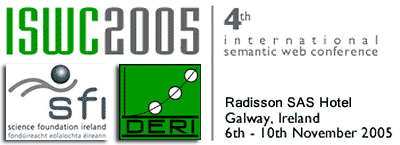 |
 |
Keynote Speaker - AbstractsUsing the Semantic Web for e-Science: inspiration, incubation, irritationCarole Goble Abstract | PowerPoint Slides (PPT, 18.6 Mb) We are familiar with the idea of e-Commerce - the electronic trading between consumers and suppliers. In recent years there has been a commensurate paradigm shift in the way that science is conducted. e-Science is science performed through distributed global collaborations between scientists and their resources enabled by electronic means, in order to solve scientific problems. The Web has served scientists well. However, standard web technology is now straining to meet the needs of scientists. I argue that scientific communities are ideal incubators for the Semantic Web: they are knowledge driven, fragmented, and have valuable knowledge assets whose contents need to be combined and used by many applications. The content is diverse, and the scale necessitates that the processing be done automatically. There are many suppliers and consumers of knowledge and a loose-coupling between suppliers and consumers - information is used in unanticipated ways by knowledge workers unknown to those who deposited it. People naturally form communities of practice, and there is a culture of sharing and knowledge curation. Already e-Science has been inspired by the results of the Semantic Web initiative, with a number of pioneering communities using RDF and OWL to enhance their knowledge applications, and even some genuine "Semantic WEB", with the emphasis on Web, examples are also starting to appear. These examples should be an inspiration to the Semantic Web community. However, there is also irritation that the wrong emphasis is being placed on what is important and what is not by the technologists leading to a communication failure between those for whom the Semantic Web is a means to an end and those for whom it is the end. The Web was developed to serve a highly motivated community with an application and a generous spirit-High Energy Physics. The Semantic Web would also benefit from the nursery of e-Science. I will explore this opportunity, the mutual benefits with some pioneering examples, and highlight some current problems and concerns: inspiration, incubation, and irritation. Semantic Acceleration Helping Realize the Semantic Web Vision or "The Practical Web"Dr. Alfred Z. Spector, Abstract | PowerPoint Slides (PPT, 2.8 Mb) The Semantic Web envisions a future where applications (computer programs) can make sense and therefore more productive use of all the information on the web by assigning common "meaning" to the millions of terms and phrases used in billions of documents. AI and knowledge representation must rise to the occasion and work with decentralized representations, imprecision and incompleteness. Standard web-based representations are an essential enabler and we have made good progress in their design. But we still rely on humans to assign semantics and here there is a big leap of faith: The World Wide Web has grown at startling rates because humans are prolific at producing enormous volumes of unstructured information, that is, information without explicit semantics; on the other hand navigating this mass of information has proven to be both possible and profitable to the point that there is a $6 B search advertising industry. It's is not practical to expect the same will automatically happen for semantically enriched content. And yet we need semantics to better leverage the huge value on the web. The Practical Web is about confronting this challenge. Its about realizing that we will need to automate the assignment of semantics to unstructured content to ultimately realize the vision of the Semantic Web. If well done the results will be synergistic with the motors of web expansion: user value and commercial value. Semantic Web Public Policy Challenges: Privacy, Provenance, Property and Personhood Daniel J. Weitzner Abstract The growing inferencing and knowledge linking power of the Semantic Web will, we all hope, make the world a better place: enrich democratic discourse, support more rapid scientific discovery, enable new forms of personal communication and culture, and generally enhance critical analysis of information. However, with this greater inferencing power comes daunting social and public policy questions that must be faced as first class technical design challenges, not just as issues to be resolved in courts and legislatures. How will we maintain fundamental privacy values in the face of inferencing and searching power that can systematically uncover sensitive facts about us even has we try to keep such data secret? Today's Web has enabled a departure from traditional editorial control and historically-trusted information sources. Will attention to provenance on the Semantic Web enable us to develop new mechanisms for assessing the reliability of information? What new challenges to already frayed intellectual property regimes will the Semantic Web bring? Finally, how will we assert and represent personal identity on the Semantic Web? At this early stage of the development of the Semantic Web, it's hard enough to have problems in focus, much less solutions. However, we believe that transparent reasoning and accountability mechanisms will play a critical role in enabling systems and services built on the Semantic Web to be more responsive to social and policy needs.
|
Super Emerald Sponsors |
|
|
||